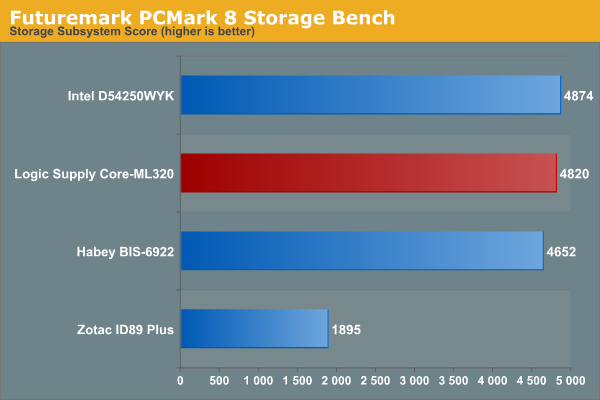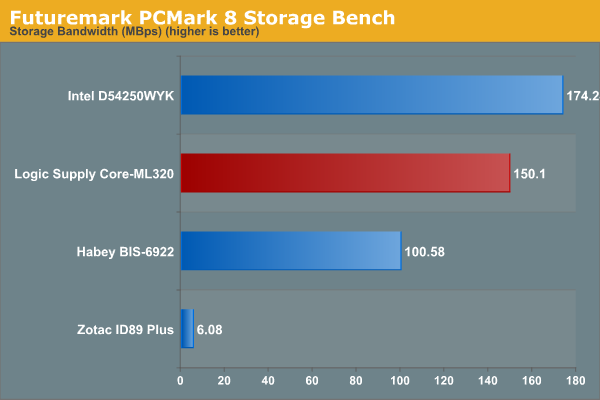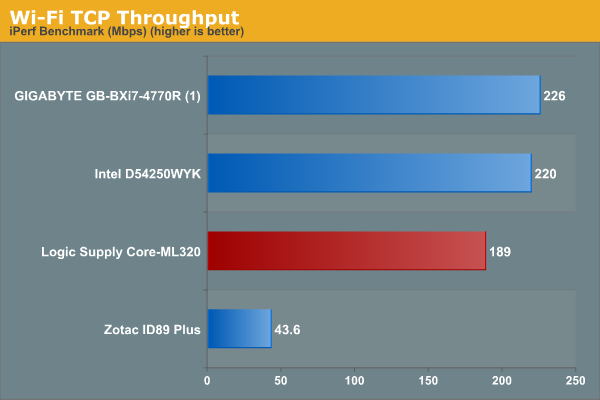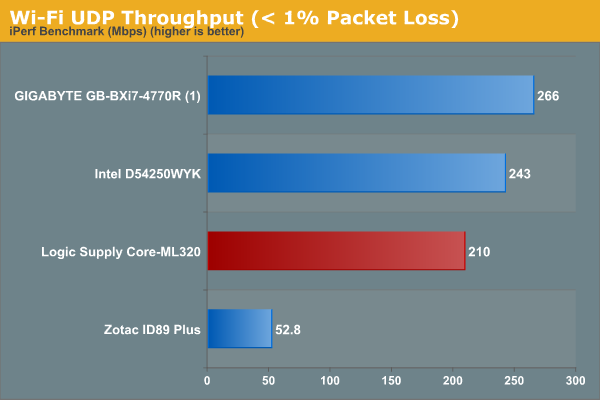Logic Supply Core-ML320 Fanless Industrial NUC Review
by Ganesh T S on April 30, 2014 3:45 PM EST- Posted in
- NUC
- Industrial PC
- Passive Cooling
- Logic Supply
Storage & Wireless Networking Credentials
Starting with this review, we have decided to devote a separate section to analyze the storage and networking credentials of the units under review. On the storage side, one option would be repetition of our strenuous SSD review tests on the drive(s) in the PC. Fortunately, to avoid that overkill, PCMark 8 has a storage bench where certain common workloads such as loading games and document processing are replayed on the target drive. Results are presented in two forms, one being a benchmark number and the other, a bandwidth figure. We ran the PCMark 8 storage bench on selected PCs and the results are presented below.
In using the PCMark 8 storage benchmark, our intent is to test the primary drive in the system. Our review sample of the Core-ML320 shipped with a 32 GB mSATA SSD as the primary drive. After the installation of the OS and adding in a couple of updates, we were down to less than 2 GB of free space on the drive. PCMark 8's storage bench, unfortunately, required more free space, and we ended up using the secondary drive (the 60 GB 2.5" SSD) for this test.


On the networking side, we restricted ourselves to the evaluation of the WLAN component. Our standard test router is the Netgear R7000 Nighthawk configured with both 2.4 GHz and 5 GHz networks.
Netgear R7000 Nighthawk Testbed Router
The router is placed approximately 20 ft. away, separated by a drywall (as in a typical US building). A wired client (Zotac ID89-Plus) is connected to the R7000 and serves as one endpoint for iPerf evaluation. The PC under test is made to connect to either the 5 GHz (preferred) or 2.4 GHz SSID and iPerf tests are conducted for both TCP and UDP transfers. It is ensured that the PC under test is the only wireless client for the Netgear R7000.
We evaluate total throughput for up to 32 simultaneous TCP connections using iPerf and present the highest number in the graph below.

In the UDP case, we try to transfer data at the highest rate possible for which we get less than 1% packet loss.

We find that the PCs equipped with 802.11ac WLAN cards perform better than the 802.11n ones. For the Core-ML320, the choice of a 2x2 dual band 802.11n card (Intel Centrino Advanced-N 6235) help in delivering very good numbers. In fact, the numbers are very close to the AC7260-equipped Intel NUC kit.











31 Comments
View All Comments
stodd - Monday, September 15, 2014 - link
Hi - any opinions on running MS-Office on the ML-320 (performance-wise)? Thanks.Steve